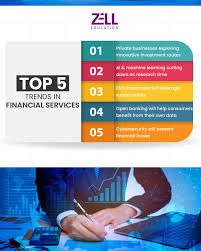The financial services industry is undergoing rapid transformation driven by technological innovations, changing consumer behaviors, and new regulations.
These disruptions are creating demand for employees with updated skillsets to help financial institutions adapt.
As a result, colleges and universities are innovating their financial markets operations curriculums to align with emerging industry needs.
This article analyzes the key trends impacting finance education and highlights innovative new courses focused on fintech, data analytics, automation, ESG investing, and more.
Fintech and Emerging Technologies
One of the biggest drivers reshaping finance education is the rise of financial technology (fintech). Fintech innovations like digital payments, robo-advisors, blockchain, and crypto assets are disrupting traditional financial services. In response, course offerings on these topics are proliferating. For example, numerous programs now offer dedicated fintech and blockchain courses explaining the technical foundations and real-world applications of these technologies. These classes prepare students for careers building fintech systems transforming finance.
Similarly, course offerings focused on artificial intelligence, machine learning, and automation are growing. These classes recognize how AI is revolutionizing areas like algorithmic trading, credit underwriting, fraud detection, and quantitative analysis. Coursework covers the most relevant programming languages like Python and R along with AI/ML methodologies needed for financial institutions’ AI strategies.
Data Analytics and Quantitative Methods
Today’s financial markets operations rely heavily on data analytics and complex quantitative methods. Thus, course offerings focused on enhancing students’ data and quantitative skills are increasing. More classes now cover advanced analytics disciplines like predictive modeling, optimization, simulation, and econometrics tailored to financial applications. Programming languages like Python and R are part of mainstream financial curriculums to strengthen technical abilities. Big data technologies such as Hadoop, Spark, and cloud platforms are also covered to process the tremendous data volumes in finance.
Furthermore, dedicated financial engineering programs blending quantitative finance, data science, and computer science are emerging. These technically focused programs develop specialist talent for the most sophisticated trading, investment, and risk analytics roles. They provide targeted graduate-level training almost as a hybrid between a finance degree and a data science degree.
ESG, Ethics, and Sustainable Finance
Sustainable investing strategies focused on environmental, social responsibility, and governance (ESG) factors are fundamentally altering finance. The growth of ESG investing is driving demand for professionals with specialized expertise surrounding sustainability issues and metrics. In response, more curriculums offer dedicated sustainable finance, impact investing, and ESG-focused investment analysis courses. These classes cover implementing ESG strategies across asset management, risk management, corporate strategy and more. Coursework also increasingly includes ethics to shape morally conscious financial leaders in a traditionally numbers-driven industry.
Specialized Programs and Certificates
For experienced finance professionals looking to reskill or upskill, more specialized certificate programs are available. Programs like fintech certificates, risk management certifications, and Chartered Financial Analyst (CFA) exam preparation provide targeted, graduate-level training in specific practice areas. These develop specialized expertise to fulfill precise skill demands among financial employers.
Likewise, online degrees and course options are increasing for accessing finance education more flexibly for working professionals. Massive open online courses (MOOCs) provide free or low-cost online education in isolation. Additionally, more universities deliver online masters programs, bootcamps, and other credential options spanning the range from undergraduate to executive education. These specialized programs and flexible online options cater skill-building to specific career transitions.
Experiential Learning and Leadership Development
Soft skills like communication, collaboration, creativity, and ethics are growing in importance across finance. Correspondingly, more curriculums incorporate experiential learning, interdisciplinary projects, presentations, and team assignments rather than solely lectures and exams. Case competitions that simulate real-world business challenges are also popular. These experiential elements develop the interpersonal abilities crucial for finance teams and leadership roles.
Likewise, new courses focused specifically on “power skills” like leadership, negotiation, crisis management, and change management are emerging. These directly build the soft skills that allow finance professionals to guide teams, broker critical decisions, communicate vision, manage partnerships, and drive strategic transformation. Developing well-rounded leadership abilities is becoming a priority.
Operations and Technology Management
Behind every financial algorithm, report, or investment decision are complex technological and operational infrastructures. Thus, understanding the systems, processes, and management behind financial operations is in-demand. In response, more programs offer courses in financial technology operations, procedures, and related domains like project management. These classes complement the analytical capabilities developed in most financial curriculums with operational execution skills crucial for technology and infrastructure-related roles.
Regulation and Risk Management
The global financial crisis spotlighted weaknesses in risk management and catalyzed a wave of new regulations. Rules like Dodd-Frank and Basel III fundamentally changed capital, liquidity, and risk management expectations for financial institutions. Parallelly, zones of under-regulation around fintech, cryptocurrencies, and decentralized finance are creating new risks.
These factors are elevating risk management and regulatory expertise needs across financial services. In response, updated course offerings focus on the latest regulatory expectations, risk models, stress testing, and compliance best practices. Classes also increasingly cover emerging risks from fintech along with the evolving cryptocurrency and DeFi rulemaking environment.
Such regulatory and risk management education ensures students understand the infrastructure safeguarding financial markets amidst disruption. With finance ever-more technology-driven, such risk and compliance knowledge helps build robust systems resilient to both operational and financial crises.
Final Words
Financial innovation is disrupting services all around the world. It is also creating a significant impact on skill demands and operating models. You can find the applications of it across multiple industries such as banking and real estate.
Finance education is adapting to these shifts by incorporating new topics into curriculums relating to technologies like AI, data analytics, and blockchain while ensuring students also have leadership skills to direct technological change. New formats like online credentials and experiential projects also enable more focused skill customization aligned to specific career transitions.
Ultimately finance education will continue innovating to navigate disruption for students and working professionals alike. Those keeping skills updated through these latest offerings will be best positioned to capitalize on the transformations underway across financial markets operations.





